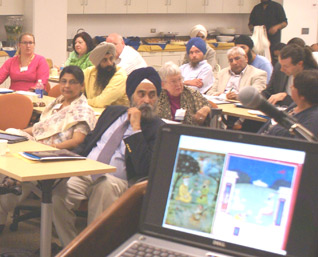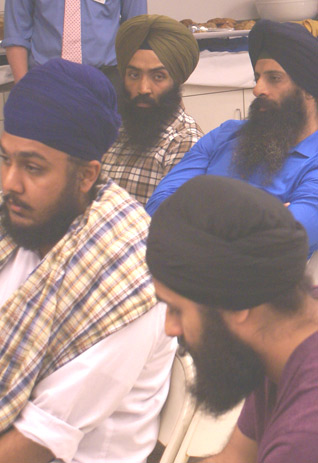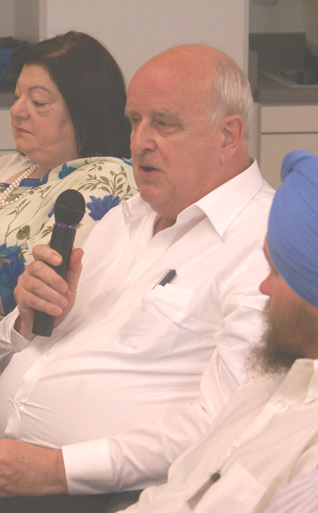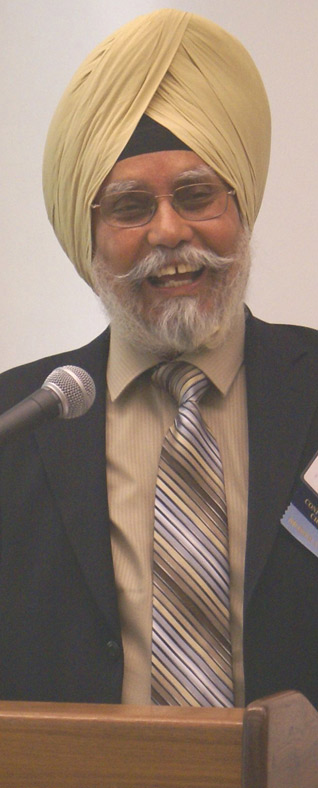Current Events
The Emergence of a Growing Sikh Studies Family
CHARLES M. TOWNSEND
On May 10 -12, 2013, the Dr. Jasbir Singh Saini Endowed Chair in Sikh and Punjabi Studies and the Department of Religious Studies at the University of California, Riverside (“UCR“) hosted a Sikh Studies conference.
This was the third major academic conference on Sikh Studies convened by the holder of the Chair, Dr. Pashaura Singh.
As a Ph.D. candidate in the Religious Studies Department at UCR and advisee of Dr. Pashaura Singh, I was one of the co-organizers of the conference, along with other graduate students, administrative staff, and undergraduate student volunteers from UCR's Religious Studies Department.
The conference was organized around the title, “Dialogues with(in) Sikh Studies: Texts, Practices, and Performances“. This ended up representing well the atmosphere and major themes of the conference.
From my perspective, the most salient and remarkable aspect of the conference was the multiplicity of perspectives and voices that were in “Dialogue” through its three days.
To begin with, this was the first time that scholars and community-sponsored Chairs of Sikh Studies from all eight of the Sikh Studies programs in North America were able to participate in a single conference together. Presenters at the conference came from North American, European, Punjabi and Indian universities, and shared papers within ten panels spread across three days.
Among these presenters, there were first and second generation Sikh-Americans as well as Sikhs from other parts of the diaspora, as well as non-Sikh scholars from the U.S. and Europe -- all of them reflecting on many different aspects of Sikh history, lives, texts, and practices.
Scholars on the panels represented (inter)disciplinary backgrounds in Religious Studies, Philosophy, Musicology and Ethnomusicology, Anthropology, Linguistics, Economics, South Asian Studies, History, and more.
Helping to co-organize the conference, I partly instigated the emphasis on living Sikh practices and performances in the language of the conference title and call for papers.
While much of the scholarly work that has built the foundation of Sikh Studies has taken textual-historical approaches, the field of Religious Studies has been increasingly influenced by approaches to 'Lived Religion' and seeing that religions are at least as much about the things that people do in their everyday lives as about beliefs and texts.
So the call for papers asked participants to explore the intersections between text, lived practice, and performance, and thus their papers reflected on broad topics relating to the conference theme's subtitle of “Texts, Practices, and Performances”, including: Sikh identity around the world (and on the internet), the life of Sikh texts within Sikh communities, Sikhi as a lived Philosophy, Sikh sacred sites, Sikh views on ecology and economics, contact and exchange in the colonial and post-colonial eras, and two panels focusing on Sikh music.
My own paper profiled people who I have interviewed as being active in teaching Gurbani kirtan to Sikh-Americans.
I viewed the conference as bringing together the many differing -- even sometimes conflicting, but always overlapping -- approaches to studying Sikh lives and Sikhism that are represented within the field of Sikh Studies. During the conference, multiple participants referred to an extended and growing “Sikh Studies family” in academia; joking that, as in other families, disagreements arise, but the family always holds together.
Certainly, warm and collegial relationships, old and new -- as well as lively debate -- were visible among the conference attendees. As a scholar starting out in my career, I have felt lucky to enter a field in which so many of the established luminaries and upcoming scholars are supportive of each other's work.
Bringing so many scholarly voices together represented the “Dialogues within Sikh Studies” aspect of the conference, and the parallel purpose of the conference -- to present opportunities for “Dialogues with Sikh Studies” -- was also obviously fulfilled.
On each day, seating within the symposium room was often full, and panelists engaged in lively, open discussions of their papers with professors and students (graduate and under-graduate) from multiple departments at UCR. Scholars from outside Sikh Studies as well as non-academicians also helped bring fresh perspectives and incisive questions to the conversations.
Conference attendees continued their dialogues and discussions over lunches and refreshment breaks each day.
On the first night, conference participants enjoyed a dinner at the UCR Alumni Center that included a program honoring Dr. Christopher Shackle (Emeritus Professor at the School of Oriental and African Studies, University of London) for his lifelong contributions to Sikh Studies, especially his “An Introduction to the Sacred Language of the Sikhs” and “A Guru Nanak Glossary“, which have become standard textbooks that have made the rich original language of Guru Granth Sahib accessible to multiple generations of scholars (the present author included).
Dr. Narinder Singh Kapany (Founder and Chair of The Sikh Foundation of Palo Alto, California) shared his personal reflections on the field of Sikh Studies and was honored for his contributions to the growth of the field through its involvement in the establishment of Sikh Studies chairs. He spoke candidly about the fact that these Chairs have sometimes been controversial, but reflected on the thousands of graduate and under-graduate students who have studied with the Chairs to date, and, moreover, the hundreds of college students each year who learn more about Sikh lives, practices, texts, and history through Sikh Study programs.
On the second night, conference participants were warmly hosted in the beautiful home of Dr. Harkeerat Singh Dhillon, a very active member of the Sikh community and an Orthopedic Surgeon in Riverside.
During the last panel of the final day of the conference, Vivian-Lee Nyitray, Chair of the Department of Religious Studies at UCR commented on how the presence of Sikh Studies Chairs in universities also raised awareness about Sikhs and Sikh Studies among the other faculty of the universities where they teach.
The past two academic conferences organized by the Dr. Jasbir Singh Saini Chair and UCR's Department of Religious Studies have produced two edited volumes (“Sikhism in Global Context“, edited by Pashaura Singh, Oxford University Press, 2011; and “Re-Imagining South Asian Religions", edited by Pashaura Singh and Michael Hawley, Brill Publications, 2013).
Those interested in the papers and proceedings of this third Sikh Studies conference will like to know that plans are underway to compile the proceedings into another edited volume and a special issue of Sikh Formations, a premier academic journal on Sikh Studies.
My own research on Sikh-Americans and the way that I teach my students at UCR and Whittier College about Sikhism (which always includes visits to local gurdwaras) have always relied on the openness and hospitality of individual Sikhs and of Sikh communities.
One thing I discussed with multiple conference attendees is a shared hope that such conferences can have a positive impact for Sikh communities in the U.S. and around the world. I think everyone who organized and participated in the conference hopes to see dialogues with and within academic Sikh Studies continue in the open and constructive ways that were visible at this conference.
May 17, 2013
Conversation about this article
1: Lara Kaur Singh (New Jersey, USA), May 17, 2013, 9:27 AM.
Conmgratulations to Dr Pashaura Singh for a job well done. Indeed, to all of the eight Chairs and other Sikh academics for finally coming together to caucus like this. This is indeed a big step forward. The infusion of new blood (Arvind, Balbinder, et al) has certainly brought new energy -- and synergy -- to the scene. All power to you guys and gals!
2: Kirat Singh (Punjab), May 17, 2013, 9:58 AM.
Excellent! Only good can come from this 'coming together' and 'working together'. Bravo!
3: Kirpal Singh (Daytona Beach, Florida, USA), May 17, 2013, 10:47 AM.
I am immensely pleased to learn about cooperation and collaboration in the Sikh academia finally at the world-wide level to promote debate and discussion in a healthy way, with the goal to advance understanding and detailed study of Sikhi and the Sikh way of life. Congratulations to all the coordinators, participants and supporters.
4: Dhanwant Singh Mundae (Calgary, Alberta, Canada), May 17, 2013, 2:13 PM.
Dr. Pashaura Singh, Congratulations for a job well done. You have set new directions in Sikh studies by including scholars and the Sikh community at large. It was long over due. Thank you.
5: Kulvinder Jit Waraich (Canada), June 27, 2013, 11:14 AM.
If we could arrange a similar conference in Toronto chaired by Dr. Pashaura Singh and other Sikh studies scholars, it would be great!






